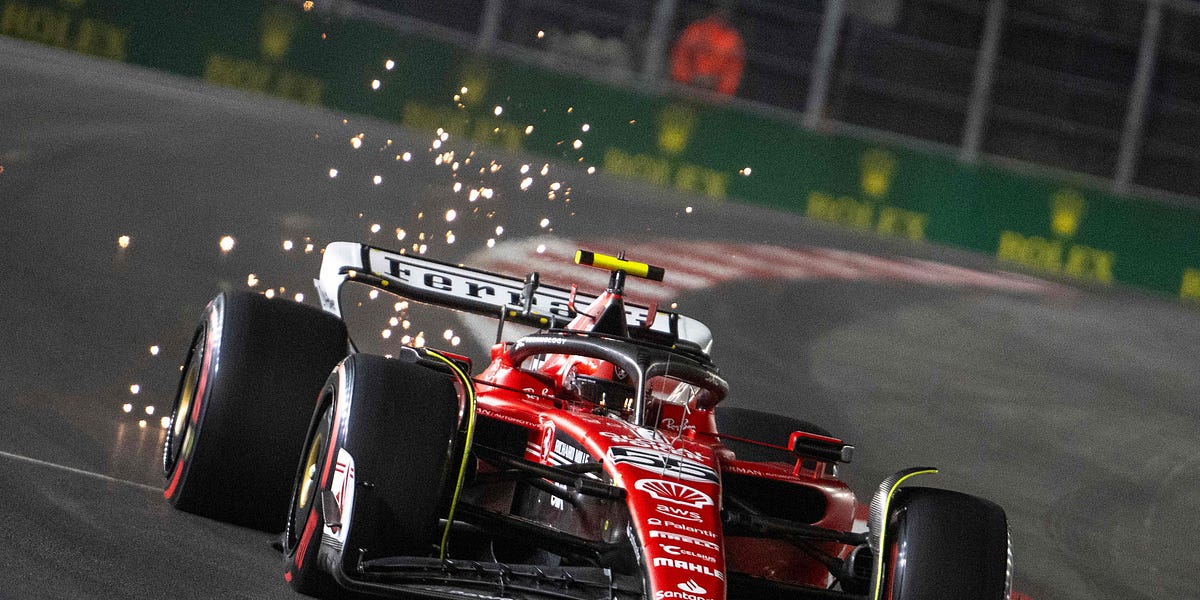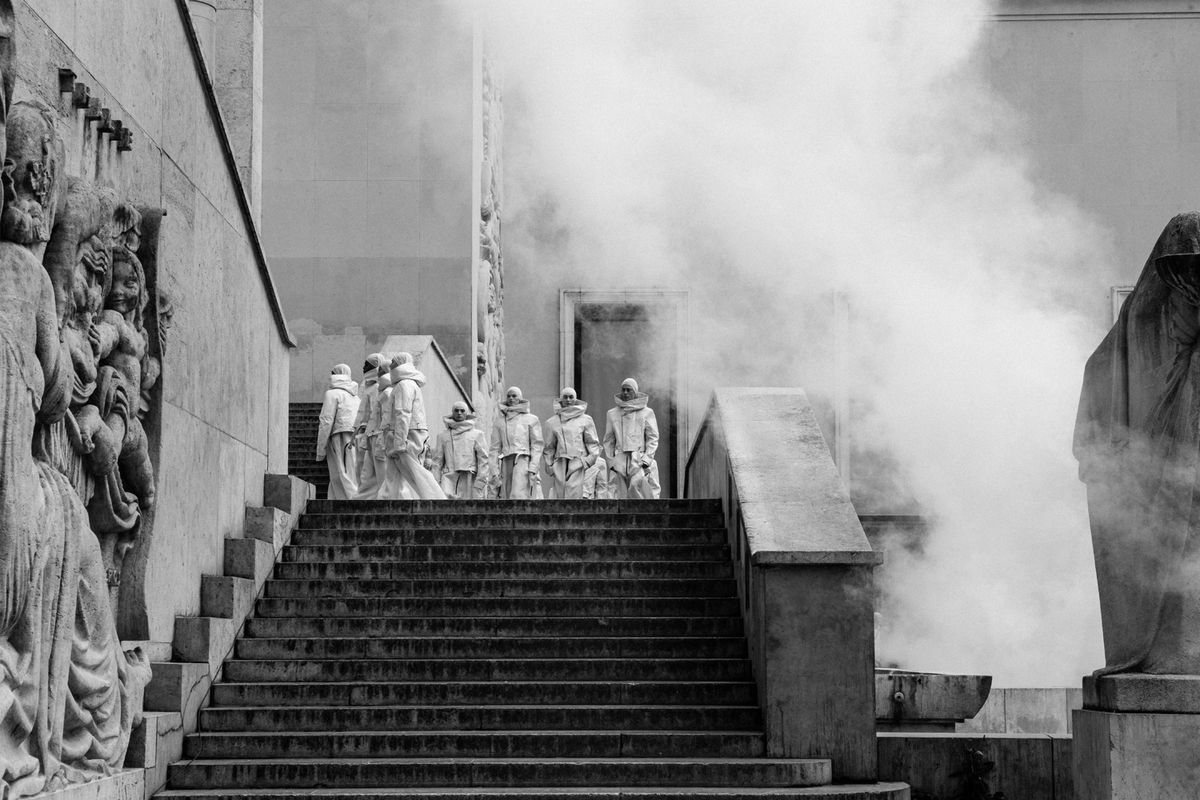Entertainment
They Begged Dems for Money—Then Spent Lavishly on Hotels and Entertainment

ON NOVEMBER 13, 2023, the political action committee Democratic Victory emailed out a fundraising solicitation expressing concerns about its financial wellbeing.
“We’re falling short of last week’s goal by 18%,” the group’s note read. “If we can’t make up that gap asap, it’ll mean we can’t send full support into battleground states to help President Biden and Democrats win.”
The email asked recipients to chip in $20 or more.
That same day, federal disclosure records show that Democratic Victory also filed an expense. But not to Biden or any other Democratic candidate. Instead, it spent $213,093.83 on lodging at the ARIA Resorts & Casino in Las Vegas, Nevada as well as $11,300 for venue rental at the same on-the-Strip hotel.
And it wasn’t done there. Democratic Victory would spend hundreds of thousands of dollars building out a November event in Vegas around the Grand Prix, one of the most highly anticipated, lavish, and expensive races on the Formula 1 calendar. Among its purchases: $736,545 for “event space rental,” $41,235 for help putting together “a VIP private viewing suite,” and thousands of more in separate hotel fees—all as the group was telling prospective donors it was struggling to meet its fundraising goals.
Such expenditures would be considered sizable for the Democratic party’s premier political groups or campaign committees. But Democratic Victory is not that. Since its founding in 2020, it has operated in near obscurity, part of a constellation of generic-sounding PACs secretly run by a group of Democratic operatives and infamous within digital-fundraising circles for their unscrupulous methods.
That changed last week. Kamala Harris’s rise as the presumptive Democratic presidential nominee has brought a fresh round of scrutiny to groups like Democratic Victory, which have issued a barrage of emails and texts pleading with donors to support the vice president’s campaign. Party officials say those solicitations are scams. They’ve accused the groups of trying to take advantage of the groundswell of support for Harris in order to line their pockets. The Harris campaign, in a statement to The Bulwark, called the PACs “bad actors” and urged supporters to avoid them.
In response, one of the main officers involved with Democratic Victory and similar groups—Ryan Morgan, the founder of the data list firm PACtion—defended their work as critical for Democratic party operations in a statement last week. This week, he declined repeated requests to answer additional questions.
Morgan’s PACs do make contributions to Democratic candidates and causes. According to Federal Election Commission records, Democratic Victory sent $185,000 to the Biden Victory Fund and $250,000 to Future Forward, the super PAC supporting the Biden-Harris ticket. And at the November 2023 Grand Prix, it made an “in-kind contribution” to some of the party’s biggest campaign entities, among them Senate Majority PAC, House Majority PAC, the Democratic Lieutenant Governors Association PAC, and the host committee for the Democratic convention. All told, Democratic Victory gave these groups event space that they valued at roughly $314,000, according to FEC records, and lodging that they valued at more than $22,000. A spokesperson for House Majority PAC confirmed its portion of the transaction, saying it used the event and lodging provided by Democratic Victory “for donor services.”
But a fuller examination of Democratic Victory’s expenditures does not paint a portrait of a group primarily acting as a helpful cog in the Democratic party’s machinery. It suggests that the PAC chiefly operates almost as a personal piggy bank, funneling small-dollar donations toward other businesses its officers operate—and supporting their lavish travel habits.
Democratic Victory paid Morgan’s PACtion nearly $1.9 million for data services. It paid Penn Avenue Consulting—a firm associated with fellow Democratic Victory officer Stephen Jewett— $284,179 for “strategic consulting.” And on May 22, 2024, it made a $100,000 contribution to a relatively new entity: Virginia is for Voters. State records show that that group was started in April of this year. The people who started it: Morgan and Jewett. Like Morgan, Jewett did not return a request for comment.
Between January 1, 2023 and the end of June 2024, Democratic Victory spent $116,635 for lodging at the Waldorf Astoria in Las Vegas, according to FEC records. Photos posted online show Morgan staying in that hotel in November 2023, right at the time Democratic Victory made a $6,122.52 payment for lodging there. Morgan was also photographed taking in the Grand Prix that same month.
On January 20, 2023, Democratic Victory paid $20,670 for “travel” to the Ritz-Carlton in New Orleans. The pattern from the floor of the lobby of that hotel was visible in a picture Morgan’s wife posted online (with Morgan in it) the month prior. In April 2023, Democratic Victory spent $19,127 at the Eau Palm Beach resort in Florida. Morgan’s wife posted a picture from the resort one week prior to the expenditure being registered.
Democratic Victory spent nearly $6,000 for chauffeur services on August 10, 2023. It made two transactions to Ticketmaster—one on March 16, 2023 and the other on the same day as the chauffeur services—totalling $71,701. The records filed by the group do not specify what specific event or events the transactions were for.
“It’s really brazen,” said Josh Nelson, CEO of Civic Shout, a digital advertising platform for Democratic campaigns and progressive nonprofits. “Scammers and grifters have been engaging in these kinds of practices for years. But the examples here are some of the most egregious and brazen I’ve ever heard.”
BUT IT ISN’T JUST HOW Democratic Victory spends its money that sparks criticism from Nelson and others. It’s how they raise it.
Democratic Victory, like the other PACs associated with Morgan (Democratic Power, Democratic Congress, and Democrats United) operates opaquely. The group has virtually no online presence and practically no transparency about who runs it. The Bulwark was able to confirm Morgan’s involvement by obtaining the group’s State of Delaware Franchise Tax report—and because of a small digital breadcrumb. Breukelen Strategies, the marketing firm that helped put together the Grand Prix VIP event, included a Democratic Victory graphic on its website. The URL attached to that graphic linked to PACtion.
Democratic Victory also routinely sends fundraising solicitations that promise to provide 700 percent matches for donations—which, experts say, is likely not real. Another solicitation claimed the group was “giving away two tickets to one lucky winner.” It is unclear if it followed through on that pledge. And it repeatedly told recipients it was falling short of its fundraising goals at the same time that it was spending lavishly.
The day the PAC registered its $19,127 in payments to the Eau Palm Beach resort, it issued an email saying, “We needed to reach out because we’re falling short of our end-of-week goal by 400 donations.” The day it spent $35,850.60 for “event tickets” with Ticketmaster, it issued an email saying that it needed to “immediately raise $25,000 so we can reach more swing voters in battleground states and spread our Democratic message.” It promised that gifts would be “TRIPLE MATCHED!”
None of this appears to be illegal. When criminal cases have been brought against political action committees, it has been because they were accused of entirely misleading donors or spending nothing on the causes or candidates they claim to support. Democratic Victory is not doing that. For that reason, it may not qualify for the non-technical term of “scam PAC” even if its practices are scam-ish.
“There’s not a legal definition for a ‘scam PAC,’” said Brandon Fischer, a longtime expert in campaign finance laws, “but these PACs appear to be spending more on raising money than they are on supporting candidates or causes. Criminal charges are only going to attach in the most extreme cases, and these patterns of fundraising and spending are questionable, but not extreme.”
But Democratic operatives say that the issue isn’t strictly about matters of legality. They believe that the groups are siphoning millions of dollars that could be used to elect Democrats. They believe that they are ruining the ability of more legitimate entities within the party to fundraise online by flooding donors with emails and texts. They scoff at the idea that Democratic Victory has to spend money at high-profile events or top hotels in order to raise money, noting that all of their fundraising is from small-dollar donors. And they believe that the infrastructure that allows these groups to operate—mainly the online giving portal ActBlue—should either try and curb their practices or deplatform them altogether.
An official at ActBlue told The Bulwark that, amid the Harris fundraising frenzy, it did reach out to these specific groups to remind them of the Account Use Policies about entities raising money through their portal. But it was not taking the step of removing them from the site.
“ActBlue has a responsibility to ensure the entities on our platform are using our technology appropriately and in line with our standards of conduct,” said Megan Hughes, ActBlue’s communications director. “When we identify potential violations, we work with [users] to correct them or move to enforcement action. ActBlue has previously deplatformed users that failed to comply with our account use policy and terms of service. We are committed to building a sustainable grassroots movement and take all issues related to our user standards seriously.”








